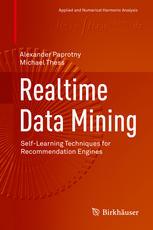

Most ebook files are in PDF format, so you can easily read them using various software such as Foxit Reader or directly on the Google Chrome browser.
Some ebook files are released by publishers in other formats such as .awz, .mobi, .epub, .fb2, etc. You may need to install specific software to read these formats on mobile/PC, such as Calibre.
Please read the tutorial at this link: https://ebookbell.com/faq
We offer FREE conversion to the popular formats you request; however, this may take some time. Therefore, right after payment, please email us, and we will try to provide the service as quickly as possible.
For some exceptional file formats or broken links (if any), please refrain from opening any disputes. Instead, email us first, and we will try to assist within a maximum of 6 hours.
EbookBell Team

0.0
0 reviewsDescribing novel mathematical concepts for recommendation engines, Realtime Data Mining: Self-Learning Techniques for Recommendation Engines features a sound mathematical framework unifying approaches based on control and learning theories, tensor factorization, and hierarchical methods. Furthermore, it presents promising results of numerous experiments on real-world data. The area of realtime data mining is currently developing at an exceptionally dynamic pace, and realtime data mining systems are the counterpart of today's “classic” data mining systems. Whereas the latter learn from historical data and then use it to deduce necessary actions, realtime analytics systems learn and act continuously and autonomously. In the vanguard of these new analytics systems are recommendation engines. They are principally found on the Internet, where all information is available in realtime and an immediate feedback is guaranteed.
This monograph appeals to computer scientists and specialists in machine learning, especially from the area of recommender systems, because it conveys a new way of realtime thinking by considering recommendation tasks as control-theoretic problems. Realtime Data Mining:Self-Learning Techniques for Recommendation Engines will also interest application-oriented mathematicians because it consistently combines some of the most promising mathematical areas, namely control theory, multilevel approximation, and tensor factorization.